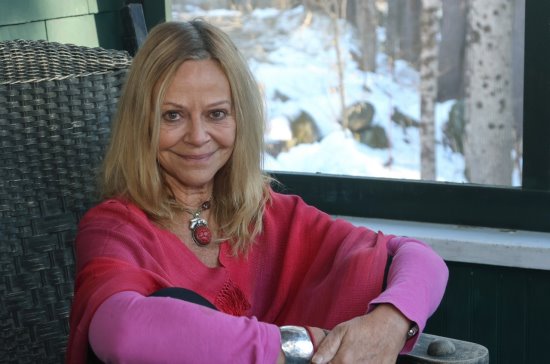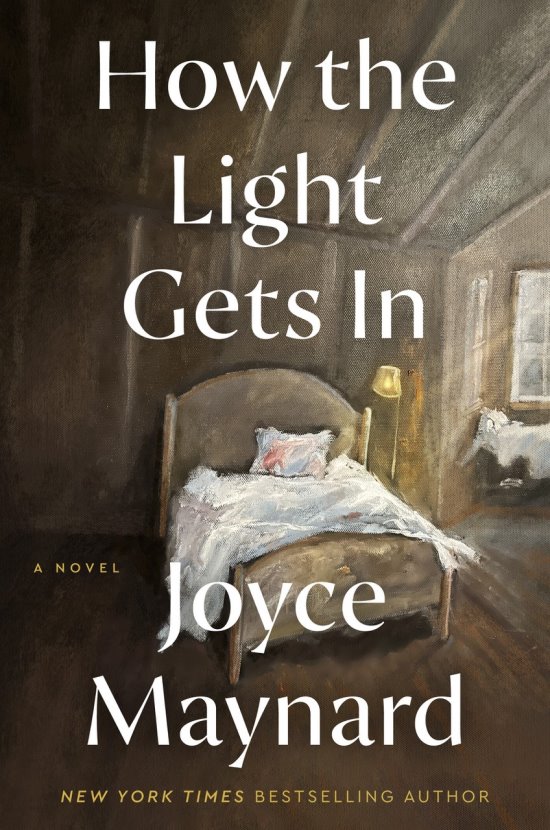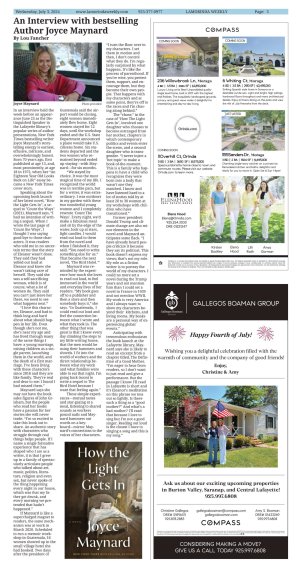| | Published July 3rd, 2024
| An Interview with bestselling Author Joyce Maynard
| | | By Lou Fancher |  | | Joyce Maynard Photo provided |
In an interview held the week before an appearance June 25 as the Distinguished Speaker in the Lafayette library's popular series of author presentations, New York Times bestselling writer Joyce Maynard's storytelling energy is earnest, effusive, intricate, and overwhelmingly honest. Born 70 years ago, first published at age 13, and, most prominently, at age 18 in 1972, when her "An Eighteen Year Old Looks Back on Life" essay became a New York Times cover story.
 Speaking about the upcoming book launch of her latest novel, "How the Light Gets In", a sequel to "Count the Ways" (2021), Maynard says, "I had no intention of writing a sequel. When I wrote the last page of 'Count the Ways', I thought I was saying good bye to those characters. It was readers who told me in no uncertain terms that the story of Eleanor wasn't done. They said they had yelled out loud at Eleanor and knew she wasn't taking care of herself. They said she was a self-sacrificing woman, which is of course, what a lot of women do. They said you can't just leave her there, we need to see what happens next."
Speaking about the upcoming book launch of her latest novel, "How the Light Gets In", a sequel to "Count the Ways" (2021), Maynard says, "I had no intention of writing a sequel. When I wrote the last page of 'Count the Ways', I thought I was saying good bye to those characters. It was readers who told me in no uncertain terms that the story of Eleanor wasn't done. They said they had yelled out loud at Eleanor and knew she wasn't taking care of herself. They said she was a self-sacrificing woman, which is of course, what a lot of women do. They said you can't just leave her there, we need to see what happens next."
 "I love this character, Eleanor, and had to think long and hard about what should happen in her life. Even though she's not me, she's near my age and has lived through many of the same things I have: a young marriage, raising children as a single parent, launching them in the world, and the death of a first marriage. I've been living with these characters since 2018 and they are like family. They're real and dear to me: I found I had missed them."
"I love this character, Eleanor, and had to think long and hard about what should happen in her life. Even though she's not me, she's near my age and has lived through many of the same things I have: a young marriage, raising children as a single parent, launching them in the world, and the death of a first marriage. I've been living with these characters since 2018 and they are like family. They're real and dear to me: I found I had missed them."
 Maynard says she may not have the book sales figures of John Grisham, but the people who read her books have a passion for her stories she will never trade. "I'm so excited to take this book out to share. An authentic story with characters who struggle through real things helps people. If I name a single formative experience that has shaped who I am as a writer, it is that I grew up in a family of spectacularly articulate people who talked about art, music, politics, literature, religion and even sex, but never spoke of the thing happening every night in our house, which was that my father got drunk, and every morning we pretended that hadn't happened."
Maynard says she may not have the book sales figures of John Grisham, but the people who read her books have a passion for her stories she will never trade. "I'm so excited to take this book out to share. An authentic story with characters who struggle through real things helps people. If I name a single formative experience that has shaped who I am as a writer, it is that I grew up in a family of spectacularly articulate people who talked about art, music, politics, literature, religion and even sex, but never spoke of the thing happening every night in our house, which was that my father got drunk, and every morning we pretended that hadn't happened."
 If Maynard is like a supercharged magnet to readers, the same mechanism was at work in March 2020. Scheduled to run a memoir workshop in Guatemala, 16 women showed up in the small village hotel she had booked. Two days after the president of Guatemala said the airport would be closing, eight women immediately flew home. Eight women stayed for 12 days, until the workshop ended and the U.S. State Department announced a plane would take U.S. citizens home. Six students departed and the two women who remained beyond ended up staying-with Maynard-for six months.
If Maynard is like a supercharged magnet to readers, the same mechanism was at work in March 2020. Scheduled to run a memoir workshop in Guatemala, 16 women showed up in the small village hotel she had booked. Two days after the president of Guatemala said the airport would be closing, eight women immediately flew home. Eight women stayed for 12 days, until the workshop ended and the U.S. State Department announced a plane would take U.S. citizens home. Six students departed and the two women who remained beyond ended up staying-with Maynard-for six months.
 "We stayed by choice. It was the most magical time of my life. I recognized the world was in terrible pain, but for a writer, it was extraordinary. I was outdoors in my garden with these two wonderful young women and I completely rewrote 'Count The Ways'. Every night, we'd make a fabulous meal and sit by the edge of the water, look up at stars, light candles. I would read out loud to them from the novel and when I finished it, they said, "You need to write something else for us." That became the next novel, 'The Bird Hotel.'"
"We stayed by choice. It was the most magical time of my life. I recognized the world was in terrible pain, but for a writer, it was extraordinary. I was outdoors in my garden with these two wonderful young women and I completely rewrote 'Count The Ways'. Every night, we'd make a fabulous meal and sit by the edge of the water, look up at stars, light candles. I would read out loud to them from the novel and when I finished it, they said, "You need to write something else for us." That became the next novel, 'The Bird Hotel.'"
 Maynard was reminded by the experience how much she loves to read out loud, to feel immersed in the world and everyday lives of her readers. "My book goes off to a publisher and then a store and then somebody buys it," she says. "In Guatemala, I could read out loud and feel the connection between what I wrote and what they took in. The other thing that was great is that I knew every day climbing the steps to my little writing house, that the men would be using their hammers and shovels. I fit into the world of workers and the direct relationship between what my work and what families were able to eat that night. I'm going back (soon) to write a sequel to The Bird Hotel because I want that feeling again."
Maynard was reminded by the experience how much she loves to read out loud, to feel immersed in the world and everyday lives of her readers. "My book goes off to a publisher and then a store and then somebody buys it," she says. "In Guatemala, I could read out loud and feel the connection between what I wrote and what they took in. The other thing that was great is that I knew every day climbing the steps to my little writing house, that the men would be using their hammers and shovels. I fit into the world of workers and the direct relationship between what my work and what families were able to eat that night. I'm going back (soon) to write a sequel to The Bird Hotel because I want that feeling again."
 These simple experiences-mutual tastes and star-gazing at a meal, listening to shared sounds as workers pound nails and Maynard hammers out words on a keyboard-mirror Maynard's connections to the voices of her characters. "I turn the floor over to my characters. I set them in motion and then, I don't control what they do. I'm regularly surprised by what happens. It's like the process of parenthood. If you're wise, you protect them, support, and encourage them, but they become their own people. That happens with my characters and at some point, they're off to the races and I'm chasing along behind."
These simple experiences-mutual tastes and star-gazing at a meal, listening to shared sounds as workers pound nails and Maynard hammers out words on a keyboard-mirror Maynard's connections to the voices of her characters. "I turn the floor over to my characters. I set them in motion and then, I don't control what they do. I'm regularly surprised by what happens. It's like the process of parenthood. If you're wise, you protect them, support, and encourage them, but they become their own people. That happens with my characters and at some point, they're off to the races and I'm chasing along behind."
 The "chase," in the case of "How The Light Gets In", involved one daughter who chooses to become estranged from her mother, chapters in which contemporary politics and events enter the scene, and a second daughter who is transgender. "I never inject a 'hot topic' to make a book of-the-moment. This is a family who happens to have a child who recognizes they were born into a body that wasn't one they matched. I know and have listened hard to a lot of stories told by at least 20 to 30 women at my workshops with children who have transitioned."
The "chase," in the case of "How The Light Gets In", involved one daughter who chooses to become estranged from her mother, chapters in which contemporary politics and events enter the scene, and a second daughter who is transgender. "I never inject a 'hot topic' to make a book of-the-moment. This is a family who happens to have a child who recognizes they were born into a body that wasn't one they matched. I know and have listened hard to a lot of stories told by at least 20 to 30 women at my workshops with children who have transitioned."
 Former president Donald Trump and climate change are also minor elements in the novel and Maynard anticipates some flack. "I have already heard people criticize it because they say its political. This book doesn't express my views; that's not my role. My role as a fiction writer is to portray the world of my characters. I could no more set a novel during the Trump years and not mention him than I could set a novel in France in 1939 and not mention WWII. My work is very America and I always want to show my characters beyond their kitchens, and living rooms. My books are a personal way of experiencing global events."
Former president Donald Trump and climate change are also minor elements in the novel and Maynard anticipates some flack. "I have already heard people criticize it because they say its political. This book doesn't express my views; that's not my role. My role as a fiction writer is to portray the world of my characters. I could no more set a novel during the Trump years and not mention him than I could set a novel in France in 1939 and not mention WWII. My work is very America and I always want to show my characters beyond their kitchens, and living rooms. My books are a personal way of experiencing global events."
 Anticipating with tremendous enthusiasm the book launch at the Lafayette library, Maynard says she is likely to read an excerpt from a chapter titled, The Definition of a Good Mother. "I'm eager to hear from readers, so I don't want to just read and give a performance. But the passage I know I'll read in Lafayette is short and it's Eleanor's meditation on this phrase we toss out so lightly. Is there such a thing as a "good mother?" And what's a bad mother? I'll read that because I love to sing but I'm not a good singer. Reading out loud is the closest I have to singing a song and this is my song."
Anticipating with tremendous enthusiasm the book launch at the Lafayette library, Maynard says she is likely to read an excerpt from a chapter titled, The Definition of a Good Mother. "I'm eager to hear from readers, so I don't want to just read and give a performance. But the passage I know I'll read in Lafayette is short and it's Eleanor's meditation on this phrase we toss out so lightly. Is there such a thing as a "good mother?" And what's a bad mother? I'll read that because I love to sing but I'm not a good singer. Reading out loud is the closest I have to singing a song and this is my song." |
 | | | | | | | | | | | | | |



